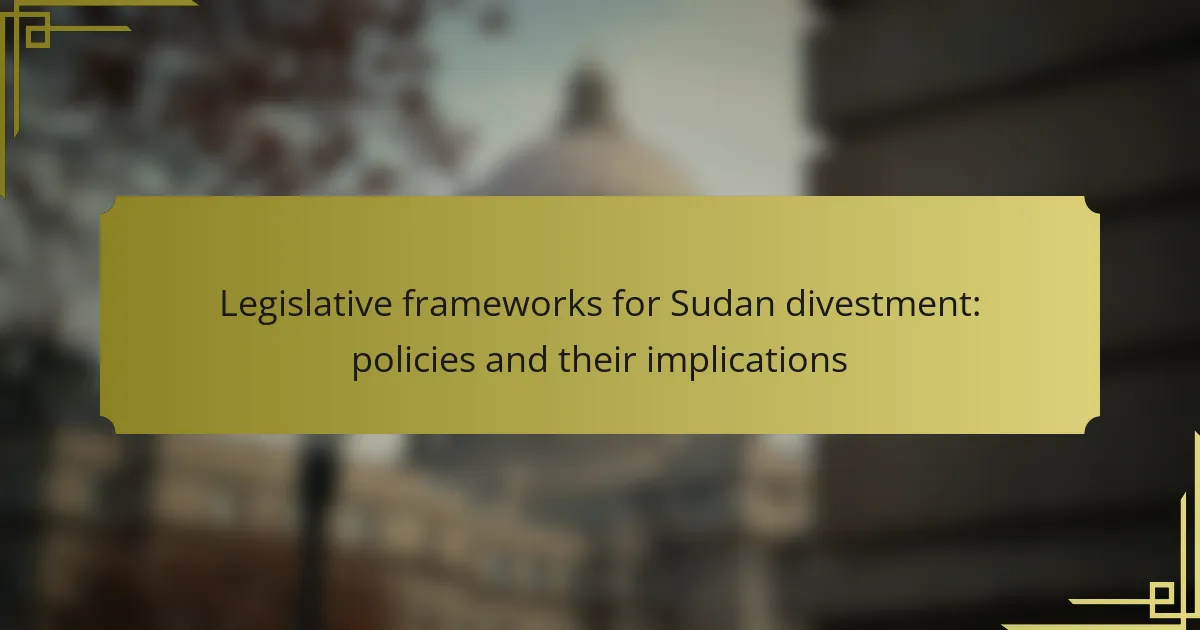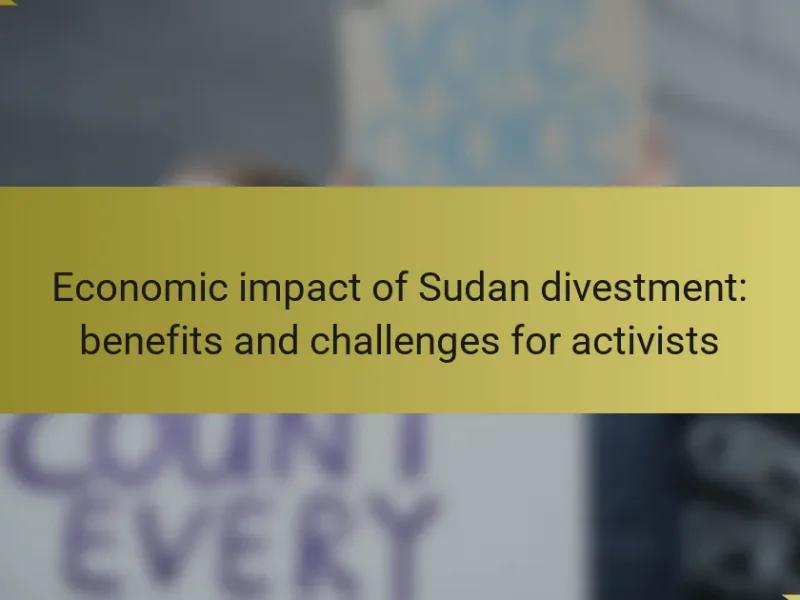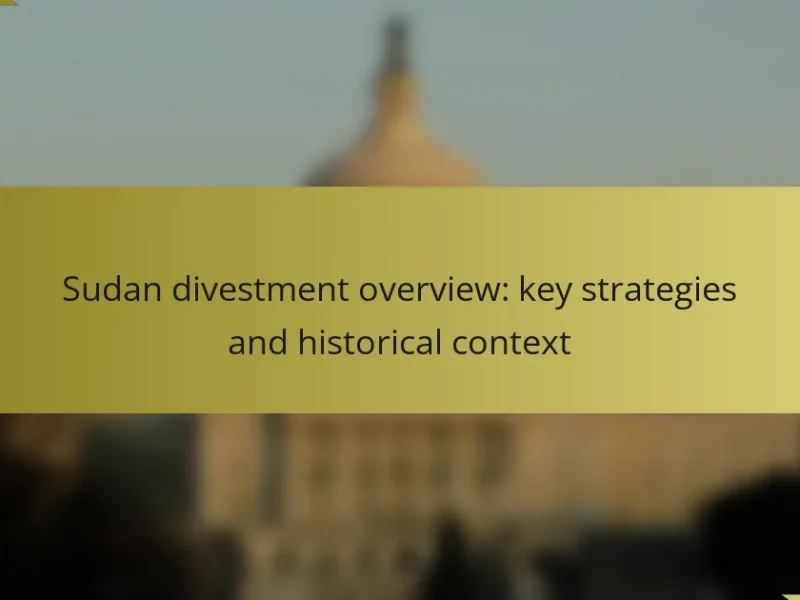The article focuses on the legislative frameworks governing Sudan divestment, particularly highlighting the federal and state laws in the United States. Key among these is the Sudan Accountability and Divestment Act of 2007, which encourages divestment from companies operating in Sudan, particularly in sectors linked to human rights abuses. The article examines the challenges of implementing divestment policies, including financial risks, political resistance, market volatility, and legal complexities. Additionally, it outlines strategies for effective divestment, emphasizing the importance of research, clear criteria, stakeholder engagement, and impact evaluation.
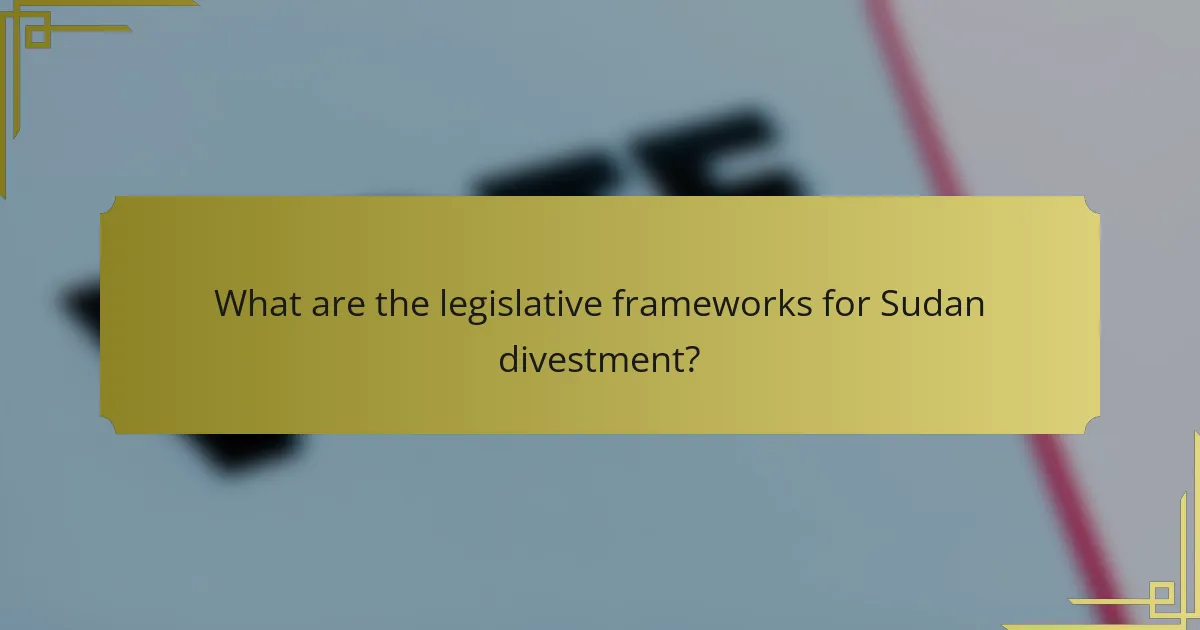
What are the legislative frameworks for Sudan divestment?
The legislative frameworks for Sudan divestment primarily include federal and state laws in the United States. The Sudan Accountability and Divestment Act of 2007 is a key federal law. It encourages states and institutions to divest from companies operating in Sudan. Various states have enacted their own divestment laws following this federal framework. These state laws often target specific sectors, such as oil and gas, which are linked to human rights abuses. Additionally, the Office of Foreign Assets Control (OFAC) imposes sanctions that affect investment in Sudan. These legislative measures aim to pressure the Sudanese government to improve human rights conditions. The effectiveness of these frameworks has been a subject of ongoing debate among policymakers and activists.
How do these frameworks impact international relations?
Legislative frameworks for Sudan divestment significantly impact international relations by shaping economic interactions and diplomatic ties. These frameworks compel countries to reconsider their investment strategies in Sudan. For example, divestment laws often lead to reduced foreign direct investment. This reduction can isolate Sudan economically and politically. Additionally, these frameworks may encourage other nations to adopt similar measures. The collective action can pressure the Sudanese government to alter its policies. Historical instances show that international sanctions and divestment can lead to negotiations and changes in governance. For instance, the divestment movement against South Africa during apartheid influenced global policy and relations.
What specific laws govern Sudan divestment?
The specific laws governing Sudan divestment include the Sudan Accountability and Divestment Act. This act was enacted in 2007. It prohibits U.S. investment in Sudan due to human rights violations. It also requires the U.S. government to divest from entities supporting the Sudanese government. Additionally, various state-level laws may impose further divestment requirements. These laws aim to pressure the Sudanese government to change its policies. They reflect concerns over human rights and humanitarian issues in Sudan.
How do these laws differ from other countries’ divestment frameworks?
Sudan’s divestment laws differ from other countries’ frameworks primarily in their focus on human rights violations. These laws specifically target entities involved in actions against civilians. Many countries have broader divestment policies that may not prioritize human rights issues. For instance, some nations focus on economic sanctions without specific human rights stipulations. Sudan’s laws also emphasize accountability for companies operating in conflict zones. This contrasts with countries that may allow investments in similar regions under different criteria. Additionally, Sudan’s divestment framework includes unique provisions for monitoring compliance. Other nations may lack such stringent oversight mechanisms. These distinctions highlight Sudan’s tailored approach to divestment in response to its specific socio-political context.
Why is divestment from Sudan necessary?
Divestment from Sudan is necessary to pressure the government to change its policies. The Sudanese government has been linked to human rights abuses and genocide, particularly in Darfur. Divestment sends a clear message that financial support is contingent upon respecting human rights. In 2018, the U.S. Department of State reported ongoing violations against civilians. Financial institutions withdrawing investments can hinder the government’s ability to fund oppressive activities. Additionally, divestment aligns with international efforts to promote peace and stability in the region. By cutting financial ties, entities can contribute to a broader movement advocating for accountability and reform in Sudan.
What are the ethical considerations driving divestment?
Ethical considerations driving divestment include human rights violations, environmental concerns, and social justice. Investors often seek to align their financial decisions with their moral values. For instance, divesting from companies involved in oppressive regimes addresses human rights abuses. This action reflects a commitment to ethical standards and social responsibility. Additionally, environmental sustainability prompts divestment from industries contributing to climate change. Studies show that socially responsible investing can lead to better long-term financial performance. Thus, ethical considerations are crucial in shaping divestment strategies.
How does divestment affect Sudan’s economy?
Divestment negatively impacts Sudan’s economy by reducing foreign investment. This leads to decreased capital inflow, limiting economic growth. The loss of investment also affects job creation and infrastructure development. As companies withdraw, local businesses suffer from reduced demand. Furthermore, divestment can lead to increased sanctions, further isolating Sudan from global markets. Historical data shows that divestment during conflicts often results in economic decline. For instance, the withdrawal of major oil companies in the early 2000s severely impacted Sudan’s oil revenue. Overall, divestment creates a cycle of economic instability and underdevelopment in Sudan.
What are the implications of Sudan divestment policies?
Sudan divestment policies aim to reduce financial support for the Sudanese government. These policies can lead to decreased foreign investment in Sudan. Consequently, this reduction may result in economic instability within the country. The divestment can also impact local businesses that rely on foreign capital. Human rights improvements may be encouraged through these policies. Additionally, divestment can affect Sudan’s international relations, particularly with nations supporting the policies. The effectiveness of these policies often depends on global cooperation and enforcement. Historical data shows that similar divestment efforts have influenced policy changes in other nations.
How do these policies influence foreign investment in Sudan?
These policies significantly deter foreign investment in Sudan. They create an unstable business environment due to regulatory uncertainty. Investors often face challenges such as unclear legal frameworks and inconsistent enforcement of laws. Additionally, economic sanctions further limit access to international markets and financial systems. This leads to increased risks for potential investors. Furthermore, geopolitical factors contribute to a lack of confidence in the Sudanese economy. Overall, these policies create barriers that discourage foreign capital inflow.
What are the potential consequences for Sudanese citizens?
Sudanese citizens may face significant economic and social consequences due to divestment policies. These policies can lead to reduced foreign investment in Sudan. A decrease in investment often results in job losses and increased unemployment rates. Additionally, divestment can exacerbate poverty levels among the population. Access to essential services like healthcare and education may decline as government revenues shrink.
The World Bank reported that economic sanctions could lead to a contraction of the Sudanese economy by up to 5% annually. This economic downturn can further destabilize the already fragile social fabric of the country. As a result, citizens may experience heightened political unrest and social tensions. Ultimately, the implications of divestment policies can severely impact the quality of life for Sudanese citizens.
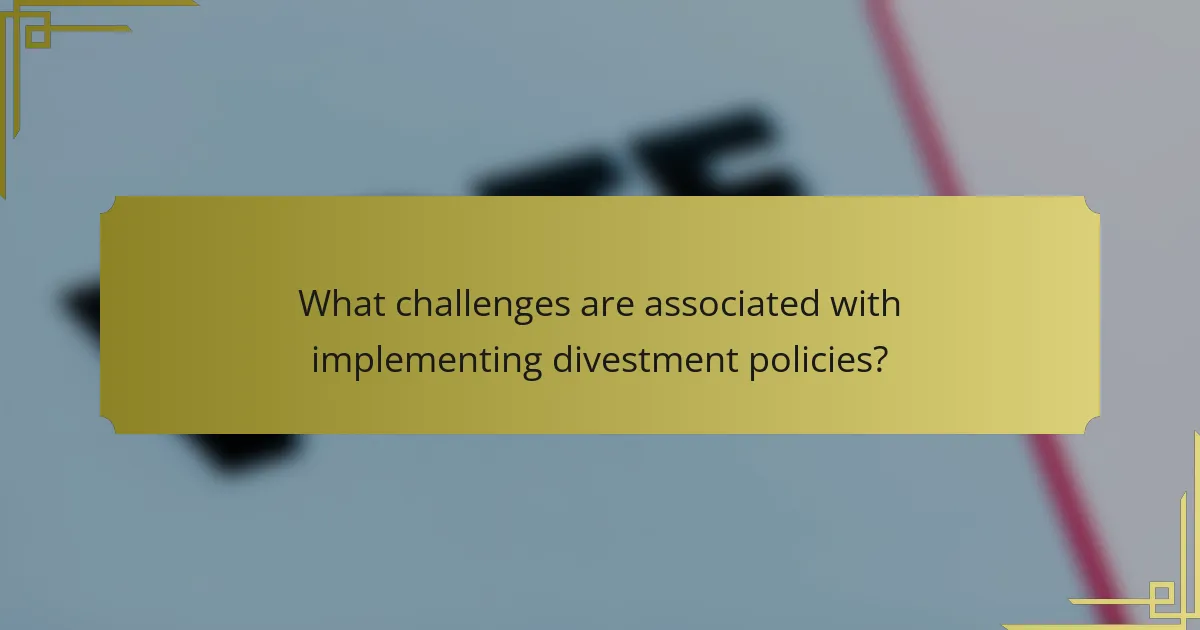
What challenges are associated with implementing divestment policies?
Implementing divestment policies faces several challenges. One major challenge is the potential financial loss for investors. Divestment can lead to reduced returns if alternative investments do not perform as well. Another challenge is the political resistance from stakeholders who may oppose divestment. This includes governments, corporations, and investors who benefit from the status quo. Additionally, there is the issue of market volatility. Sudden divestment can destabilize markets, affecting both local and international economies. Legal complexities also arise, as divestment policies must navigate existing laws and regulations. Furthermore, there is the challenge of achieving consensus among diverse stakeholders. Different interests can lead to disagreements on the best approach to divestment. Lastly, the effectiveness of divestment in achieving social or political goals can be questioned. Critics argue that divestment alone may not lead to meaningful change.
How do political dynamics affect divestment efforts?
Political dynamics significantly influence divestment efforts. Changes in government leadership can alter priorities regarding divestment policies. For instance, a supportive administration may promote divestment from oppressive regimes, while an opposing one may resist such measures. Legislative actions can also reflect public sentiment and activism, impacting the urgency and scope of divestment initiatives. In Sudan, international political relations have affected sanctions and divestment strategies. For example, the U.S. lifted some sanctions in 2017, which influenced investment flows and divestment discussions. Thus, political contexts shape the feasibility and effectiveness of divestment efforts.
What role do international organizations play in these challenges?
International organizations facilitate cooperation and coordination among nations addressing challenges in Sudan divestment. They provide a platform for dialogue and negotiation on policies. Organizations like the United Nations and the African Union monitor compliance with international laws. They also offer technical assistance to countries implementing divestment measures. Reports from these organizations highlight the impact of divestment on Sudan’s economy. Their findings inform policy decisions and legislative frameworks. Additionally, international organizations advocate for human rights and sustainable practices in Sudan. They mobilize resources and support for affected communities.
How can businesses navigate the complexities of divestment?
Businesses can navigate the complexities of divestment by understanding legal requirements and assessing financial implications. They should conduct thorough due diligence to identify affected assets and stakeholders. Engaging with legal experts ensures compliance with relevant regulations. Developing a clear divestment strategy helps in managing risks effectively. Communication with stakeholders maintains transparency throughout the process. Monitoring market conditions allows businesses to time their divestment optimally. Additionally, evaluating potential buyers can enhance the chances of a successful transaction. Historical data indicates that well-planned divestments can lead to improved financial performance post-divestment.
What are the criticisms of current divestment frameworks?
Current divestment frameworks face several criticisms. Critics argue that these frameworks often lack enforceability, leading to ineffective actions. Many believe that divestment does not sufficiently pressure targeted entities to change their behavior. Additionally, some frameworks are seen as overly broad, potentially harming local economies and communities. Critics also highlight the lack of transparency in the divestment process. This opacity can lead to mistrust among stakeholders. Furthermore, there is concern that divestment may simply shift investments rather than eliminate harmful practices. Overall, these criticisms suggest that current frameworks may not achieve their intended goals effectively.
How do critics argue against the effectiveness of divestment?
Critics argue against the effectiveness of divestment by stating it does not significantly impact targeted entities. They believe that divestment merely shifts investments rather than reducing capital for the targeted companies. Critics also point out that divestment can harm local economies and communities dependent on those industries. Furthermore, they argue that the act of divesting may create a false sense of accomplishment without leading to tangible change. For instance, a study by the Harvard Business School indicated that divestment often has limited financial repercussions on large corporations. Critics assert that engagement with companies may yield more substantial results than divestment alone.
What alternative approaches have been proposed?
Alternative approaches to Sudan divestment include targeted sanctions and engagement strategies. Targeted sanctions focus on specific individuals or entities responsible for human rights violations. These sanctions aim to minimize economic harm to the general population while holding perpetrators accountable. Engagement strategies promote dialogue and cooperation with Sudanese authorities to encourage reform. These approaches seek to balance pressure with opportunities for positive change. Studies indicate that targeted sanctions can be effective in altering behavior when combined with diplomatic efforts. The effectiveness of these approaches is supported by historical examples, such as sanctions on South Africa during apartheid.
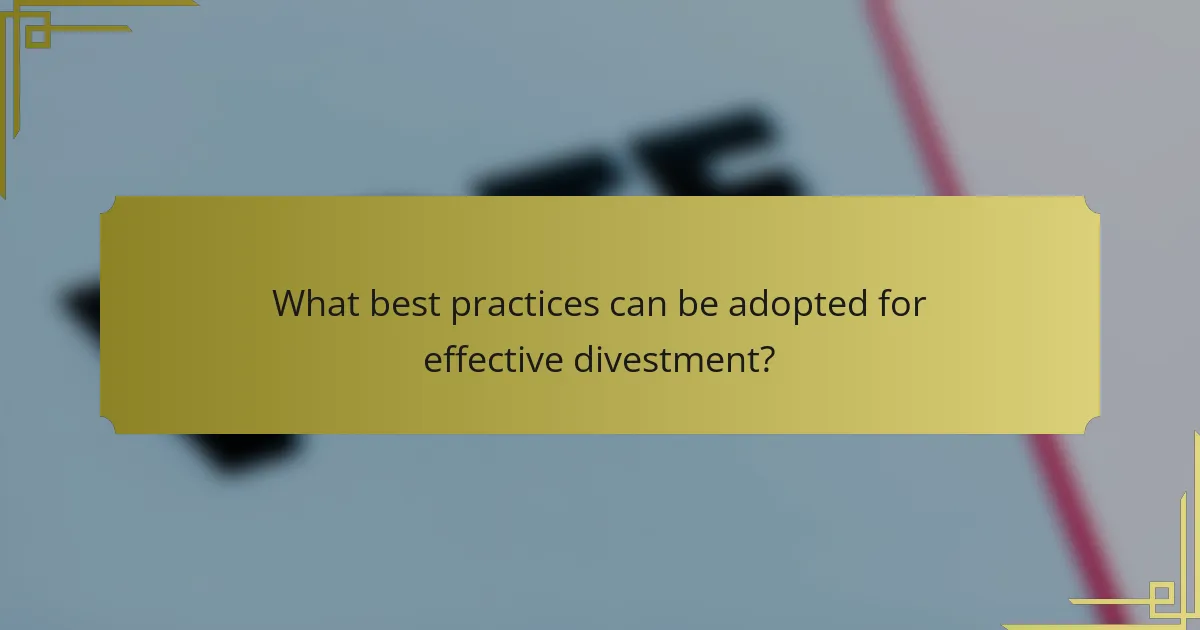
What best practices can be adopted for effective divestment?
Effective divestment requires a strategic approach. First, conducting thorough research on the entities involved is essential. This includes understanding their financial health and social impact. Second, establishing clear divestment criteria helps in making informed decisions. Criteria may include ethical considerations and alignment with organizational values. Third, engaging stakeholders throughout the process fosters transparency and support. Communication with investors, employees, and community members is critical. Fourth, monitoring and evaluating the impact of divestment is necessary. This ensures that the intended outcomes are achieved. Finally, documenting the divestment process aids in accountability and future reference. These practices enhance the effectiveness of divestment initiatives.
How can stakeholders ensure compliance with divestment laws?
Stakeholders can ensure compliance with divestment laws by implementing thorough due diligence processes. They should regularly review investment portfolios to identify entities that may violate divestment laws. Additionally, stakeholders must stay informed about the latest legislative changes and requirements related to divestment. Training and educating staff on compliance standards is crucial. Engaging legal experts can provide clarity on complex regulations. Establishing internal compliance programs can help monitor adherence to these laws. Regular audits of compliance practices can identify potential issues early. These measures collectively enhance compliance with divestment laws.
What strategies can businesses implement for responsible divestment?
Businesses can implement several strategies for responsible divestment. First, they should conduct thorough assessments of their investments. This includes evaluating the social, environmental, and governance impacts of their portfolio. Second, businesses can engage with stakeholders to understand community concerns. This engagement helps in making informed divestment decisions that align with ethical standards.
Third, they can establish clear divestment criteria based on ethical guidelines. These criteria should reflect the company’s values and commitment to responsible practices. Fourth, businesses can develop a phased divestment plan. A gradual approach allows for better management of financial impacts and stakeholder relations.
Additionally, companies can communicate transparently about their divestment process. Transparency builds trust with stakeholders and demonstrates accountability. Finally, businesses should consider reinvesting in sustainable alternatives. Redirecting funds towards socially responsible investments can enhance their reputation and align with corporate social responsibility goals.
These strategies are supported by the increasing demand for ethical business practices and the growing importance of sustainability in investment decisions.
How can advocacy groups support effective divestment initiatives?
Advocacy groups can support effective divestment initiatives by raising awareness about the impacts of investments in problematic sectors. They can mobilize public support through campaigns and educational programs. Advocacy groups can also engage with policymakers to influence legislative changes. They often provide research and data to substantiate their claims. This data can highlight the ethical and financial risks of continued investment. Furthermore, advocacy groups can collaborate with other organizations to amplify their message. They can create coalitions that strengthen their collective voice. Effective communication strategies can enhance their outreach and impact.
What resources are available for understanding Sudan divestment policies?
Key resources for understanding Sudan divestment policies include academic articles, government reports, and non-governmental organization (NGO) publications. Academic articles provide in-depth analyses of the legal frameworks and economic implications of divestment. Government reports detail official policies and legislative actions related to Sudan. NGOs often publish assessments and recommendations on divestment strategies and their impacts on human rights and economic development. The U.S. Department of State and the United Nations also offer valuable information on sanctions and divestment policies concerning Sudan.
Where can stakeholders find updated information on legislative changes?
Stakeholders can find updated information on legislative changes through official government websites. These websites often publish announcements and updates regarding new laws and amendments. Additionally, legal research databases provide access to legislative documents and analyses. News outlets that focus on political reporting also cover significant legislative changes. Professional organizations and advocacy groups often issue reports and newsletters on relevant legislation. These sources ensure stakeholders have access to timely and accurate information regarding legislative changes.
What tools can assist in assessing the impact of divestment policies?
Tools that can assist in assessing the impact of divestment policies include economic impact assessments, stakeholder analysis, and sustainability reporting frameworks. Economic impact assessments evaluate the financial implications of divestment on local and national economies. Stakeholder analysis identifies affected parties and their interests, providing insight into social consequences. Sustainability reporting frameworks, such as the Global Reporting Initiative, help measure environmental and social outcomes. These tools collectively provide a comprehensive understanding of divestment effects, enabling informed decision-making.
The main entity of this article is the legislative frameworks for Sudan divestment, which encompass federal and state laws in the United States aimed at addressing human rights violations linked to the Sudanese government. Key laws, such as the Sudan Accountability and Divestment Act of 2007, encourage divestment from companies operating in Sudan and impose sanctions through the Office of Foreign Assets Control (OFAC). The article explores the implications of these frameworks on international relations, the Sudanese economy, and potential consequences for citizens, while also addressing challenges in implementation and criticisms of current divestment strategies. Additionally, it highlights alternative approaches, best practices for effective divestment, and resources available for stakeholders to understand and navigate these policies.
